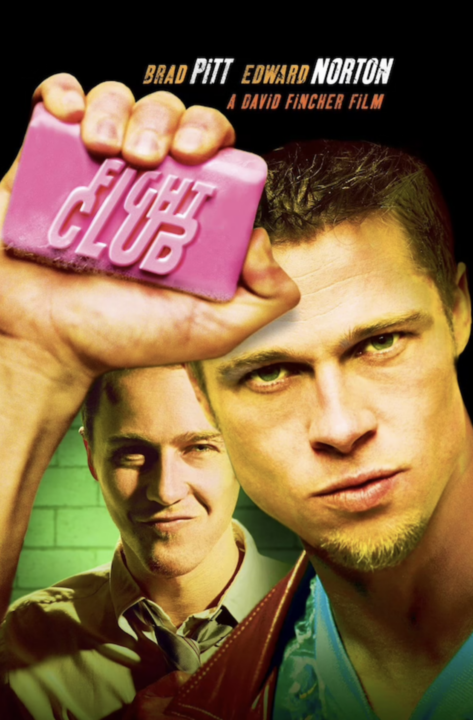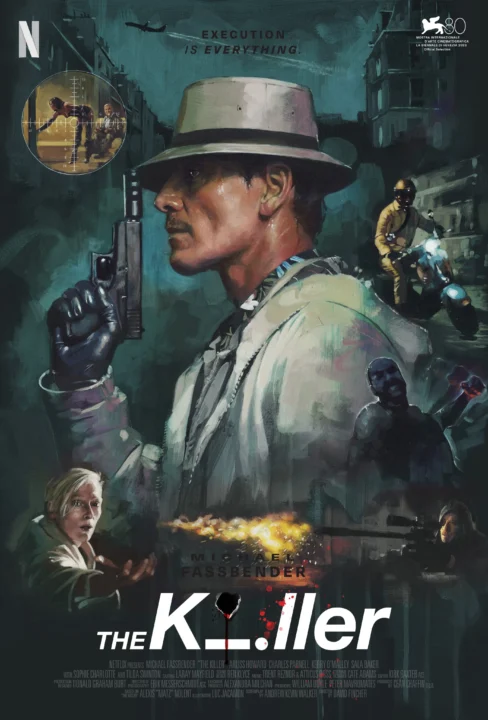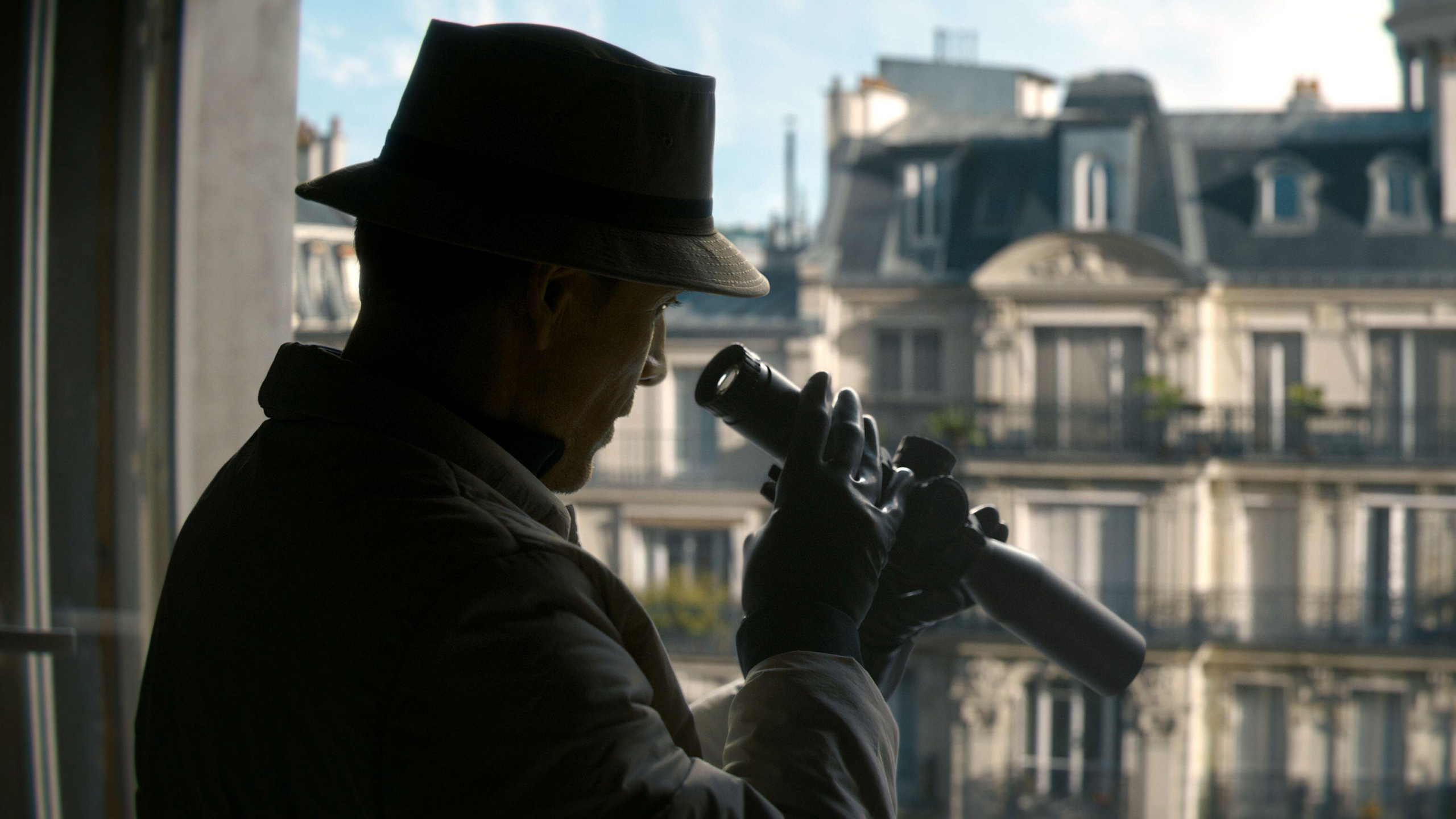I guess you could say I was ahead of the curve as a kid, in literature and long division and, as it turned out, in existential crises. Mine came in middle school. I became terrified that life was meaningless. I became terrified that God wasn’t real. Most of all, I became terrified that I would grow up to become (a phrase my CFO father has never forgotten hearing from the lips of his eleven-year-old son) a “corporate slave.”

David Fincher’s Fight Club, released in 1999, both captured my despair and solved it. The unnamed narrator, played by Edward Norton, is plagued by a crippling boredom at the end of history. Filling his apartment with more and more pathetic Ikea furniture, he uses consumerism as a coping mechanism for the tedium of his dreaded cubicle. His only remedy for insomnia is auditing crisis support groups and chasing the emotional release he gets from pretending to be at death’s door, until he meets Brad Pitt’s Tyler Durden, who shows him a new way to chase dopamine—but we’re not allowed to talk about that. Durden describes the malaise like this:
An entire generation [of] slaves with white collars. Advertising has us chasing cars and clothes, working jobs we hate so we can buy s— we don’t need. We’re the middle children of history, man. No purpose or place. We have no Great War, no Great Depression. Our great war is a spiritual war; our great depression is our lives.
I say this both captured my despair and solved it, because where the film goes from there showed me the logical conclusion of my adolescent nihilism, which I had come to see as the only honest alternative to the Catholic faith. Thank God, by his grace, I found my way to choosing the other option.
Fight Club hasn’t aged terribly well, not only because its third act has some real narrative problems, but also because its great dilemma is not ours. The end of history ended within two years of Fight Club’s release, and its approaches to capitalism and masculinity seem simplistic and juvenile with twenty-five years of hindsight. No question it’s still entertaining, but it’s also the kind of movie you’re embarrassed to admit had once defined your whole personality. But Fincher is ruthlessly contemporary, and he has updated his social commentary many times since. To take just one example, from roughly halfway between Fight Club and today, think of 2010’s The Social Network, wherein the chilly Gen-X realism of David Fincher combines with the Boomer optimism of Aaron Sorkin (of West Wing screenwriting fame) to diagnose the genesis of social media as Millennial social deprivation and aspiration (guilty as charged). Every entry in the Fincher canon aims to show us ourselves, and especially the version of ourselves we like to hide from: Alien 3, Se7en, The Game, Fight Club, Panic Room, Zodiac, The Curious Case of Benjamin Button, The Social Network, The Girl with the Dragon Tattoo, Gone Girl, even Mank. And as of November, David Fincher has a new film, now playing at a Netflix near you, that once again updates Fight Club’s existential crisis for our time.
For Norton, facing the meaningless abyss is the heroic end of an arduous quest; for Fassbender, the meaningless abyss is his comfort blanket.

The Killer is adapted from a French graphic novel, and it is atmospherically inspired by the classic French film Le Samouraï (fun fact: the latter was first released in America under the title The Godson, even though no godson is mentioned in the script, just to capitalize on the contemporaneous popularity of The Godfather). The eponymous killer is played by Michael Fassbender (who agreed to take the part only if Fincher agreed to work around the Formula-1 schedule that has kept Fassbender otherwise occupied for the past half-decade). Like Norton in Fight Club, Fassbender’s protagonist is never given a name—or rather, he is never given a real name, just a nonstop series of aliases borrowed from seventies sitcoms. The Killer is divided into six chapters, in six locations: Paris; the Dominican Republic; New Orleans; St. Petersburg, Florida; Beacon, New York; and Chicago.
The first scene could be a short film all its own, as the killer hides out in an abandoned WeWork in the cinquième arrondisement, doing yoga, listening to the Smiths, charting his vitals on his smartwatch, eating sausage McMuffins but skipping the bread, meticulously attending to personal hygiene, repeating and repeating and repeating his life philosophy in his head, and waiting for his target. He almost seems like a bad-guy version of James Bond (and not the emotionally nuanced Daniel Craig version): a perfect spy, with flawless technique, and total self-mastery. In a word, precision. But anyone who knows Fincher knows better, because while the killer may talk a good game to himself, David Fincher is notorious for the view that we mortal men do not use words to explain, but to lie. His films employ dialogue not for exposition, but to interrogate our deepest psychological deceptions (making David Fincher the Stephen Sondheim of the silver screen—I doubt Fincher will ever try a musical, but Company is sitting right there). In the case of the killer, Fassbender’s confident voiceover refrain is that of an unreliable narrator. He is lying to us, because he is lying to himself. And all the life-hacks and all the mantras are shown to be so much posturing, when after days of prep go just according to plan, the killer shoulders his weapon—and misses.
The rest of the story unfolds from there, as the killer flies around the world to tie up the loose ends his failure has occasioned. I won’t spoil the narrative beats, but suffice it to say that the actor who played Sauron is as enormous as ever, and that Tilda Swinton taking a top-shelf whiskey flight for her last supper is the best thing I saw onscreen last year. Some critics have complained that The Killer is merely an impeccable genre exercise, and I agree with all but the “merely.” This is more than a Hitchcock study and certainly more than a Netflix movie, at least for the viewer who is willing to see himself in this character. I am no longer flirting with nihilism, but The Killer is a speculum iustitiae for thirty-something me just as Fight Club was for pre-teen me, a “mirror of justice” that shows me myself in all my shortcomings and insecurities.
Let’s start with the brands. I’ve already mentioned WeWork and McDonald’s—now add to that Apple, Fiji, Ace Hardware, Fed-Ex, Häagen-Dazs, Starbucks, Android, Google Maps, Amazon, Wordle, Bitcoin, Postmates, and a not-so-subtly disguised Equinox (technically “Baliquinox,” which gets around the gym’s refusal to be featured by giving my former employer a pretentious faux-zen twist). Fincher is no stranger to product placement, and their deployment here is incredibly funny—cf. the killer breaking into a billionaire’s apartment with a key-fob copier he bought on his smartphone for $60.38 (“Save 5%”) and picked up twenty-four hours later at an Amazon Locker. But this isn’t Norton’s compulsive Ikea addiction of 1999 (and not just because Fassbender’s taste in contemporary furniture seems significantly more expensive). There is a complacency with consumerism in The Killer, not a condoning of it exactly, but a confession that we’re all numb to it by now. Capitalism is no longer our oppressive overlord; more like our pharmacist—or our personal trainer. The gig economy keeps us comfortable, and mostly we just take it for granted. No one is tempted to rise against the system. There is no outrage. There is barely recognition. Even hired guns drink oat milk lattes.

Is that a meta commentary on Fincher selling out to Netflix? Perhaps. And it isn’t the only meta reading available for this film. One Letterboxd review called the Paris misfire Fincher’s worst nightmare: being allowed only one take. Of course he’s notorious for having shot the opening scene of The Social Network over a hundred times, and for having traumatized Jake Gyllenhaal on Zodiac by deleting dozens of takes with the click of a button. The myth of David Fincher, true or contrived, is that of precision personified. Is The Killer an admission that his obsessive care for details is just a coping mechanism? Is mine?
At one point in the abandoned coworking space, doing pushups on his fingertips as “I Know It’s Over” plays on his iPod Nano, Fassbender opines, “Skepticism is often mistaken for cynicism.” It isn’t clear to me which of these he means to identify with, and personally I might have diagnosed him as more Stoic than anything, in starker contrast with Swinton’s Epicurean. But surely the killer is right that he is some kind of Minor Socratic: He is high on pseudo-profundities and therapeutic life-hacks, all to cope with the anxiety of existence in a decadent age. He is a control freak with main-character syndrome, who keeps himself sane by the illusions of detachment and self-determination. The drab, pedestrian, automatic world of the Nineties is long gone, and it looks quaint in comparison (recall that Fight Club was the same year as Office Space, The Matrix, American Beauty, and Eyes Wide Shut). For Norton, the problem was boredom; for Fassbender, the problem is insecurity. For Norton, the fear was that the world had nothing to offer; for Fassbender, the fear is that he has nothing to offer. For Norton, routine was the enemy; for Fassbender, routine is his only defense. For Norton, the goal was liberation from a world of control; for Fassbender, the goal is control in a world that’s all too liberated. For Norton, facing the meaningless abyss is the heroic end of an arduous quest; for Fassbender, the meaningless abyss is his comfort blanket.
In that opening scene, Fassbender styles himself a Nietzschean superman, and one of the few: “Most people refuse to believe that the great beyond is no more than a cold, infinite void. But I accept it, along with the freedom that comes from acknowledging that truth.” But the rest of the film is there to undermine the killer’s pretensions. He misses his target. He misjudges the power of a nail gun, and the dosage of a sleeping pill. He’s paranoid that he’s being chased by the cops, then detected by a police dog, then followed by an assassin—but none of this is true. He chants, “Refuse empathy,” but then shows it to every woman in the movie. He’s convinced the billionaire client of the hit-gone-wrong is obsessively plotting against him, when it turns out he barely registers as an afterthought. Vengeance has been replaced by customer service.
I showed The Killer to my seminarian confreres at the end of the semester (in part because it’s the rare Netflix offering with almost no graphic violations of the sixth commandment, and the split-second it does have makes even this is a matter of apathy). About halfway through the runtime, a pious French kid leaned over to me and whispered, “Is he going to convert in the end?” Apologies, monsieur l’abbé, this isn’t that kind of movie. And yet . . .
The killer gets an epilogue back home in the DR, making espresso (with a lemon twist) for the love of his life, as the sun shines, and birds chirp, and waves crash in what looks like tropical paradise. The voiceover returns, one last time, but in a brighter tone of voice. “The need to feel secure,” he says: “It’s a slippery slope. Fate is a placebo. The only life path: the one behind you.” So far, so familiar. But the next lines, the last of the film, do show something new in Fassbender: “If, in the brief time we’re all given, you can’t accept this, well maybe you’re not one of the few. Maybe you’re just like me: one of the many.”
The killer is still a nihilist in creed, but he has become an everyman—or admitted to himself that he was one all along. The difference is that, after his loss of control, the “cold, infinite void” is no longer a consolation. He no longer fits with it. It no longer works for him. The void is a demanding god, and he isn’t cold enough for it after all. This is not so much a crisis of faith, then, as a crisis of hope. He can’t help but believe in the void; he just can’t manage to apply it to his own life anymore. The casual viewer might think this is a happy ending, but no Fincher fan would fall for that. They’ll have watched closely enough to see, at the last instant, the twitch in the killer’s face.
Fate is a placebo, but so is nihilism. And it isn’t strong enough.
